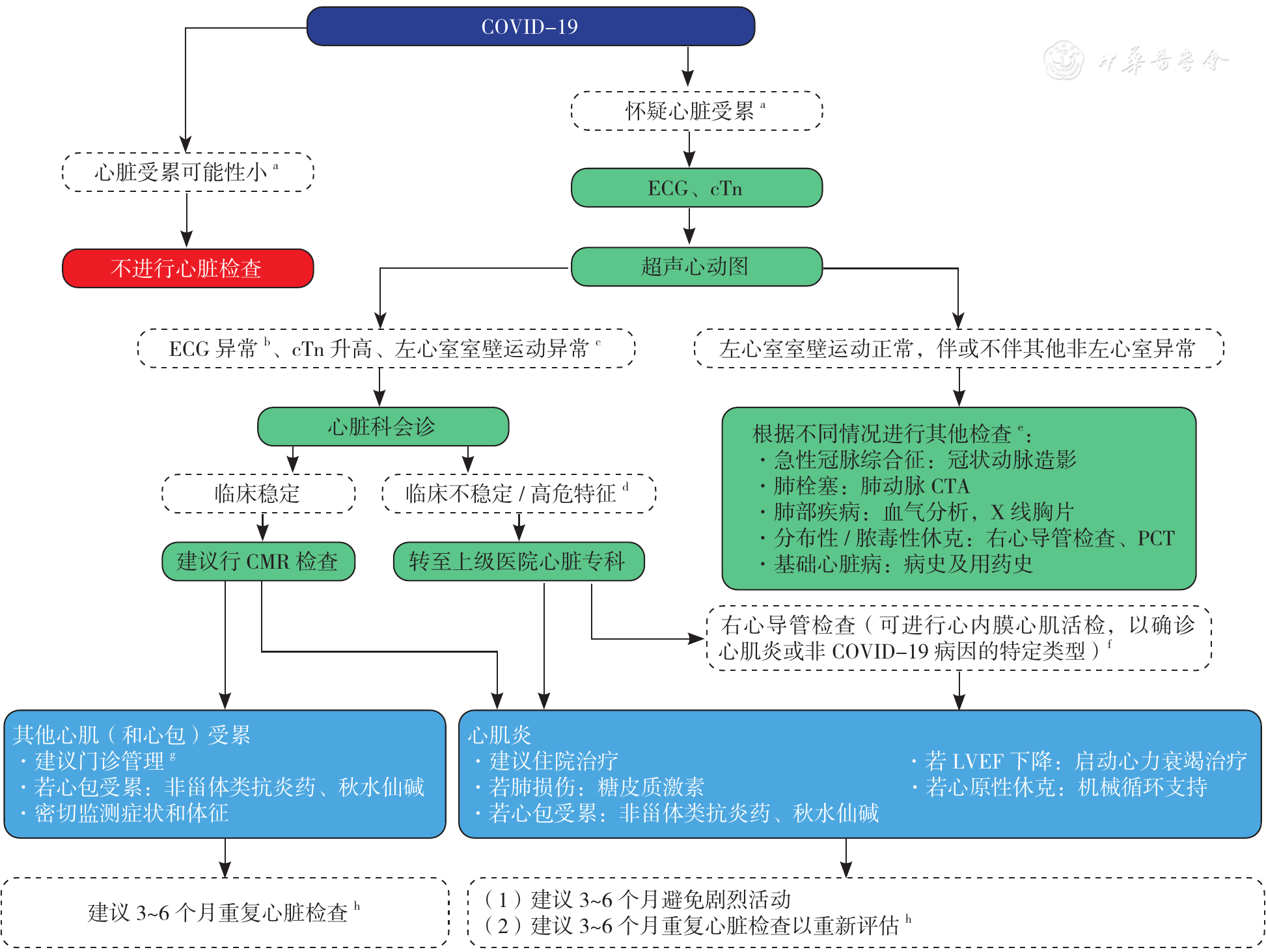中国全科医学 ›› 2023, Vol. 26 ›› Issue (14): 1692-1702.DOI: 10.12114/j.issn.1007-9572.2023.0083
所属专题: 指南/共识最新文章合辑; 新型冠状病毒肺炎最新文章合辑; COVID-19疫情防控研究
国家老年医学中心, 中国老年医学学会心电与心功能分会, 北京医学会心血管病学分会影像学组, 中国医药卫生文化协会心血管健康与科学运动分会
收稿日期:2023-01-30
修回日期:2023-02-17
出版日期:2023-05-15
发布日期:2023-02-24
基金资助:National Center of Gerontology, Electrocardiology and Cardiac Function Branch of Chinese Geriatric Society, Imaging Group of Cardiovascular Department, Beijing Medical Association, Chinese Medical and Health Culture Association Cardiovascular Health and Science Sports Branch of China Health Culture Association
Received:2023-01-30
Revised:2023-02-17
Published:2023-05-15
Online:2023-02-24
摘要: 新型冠状病毒感染(COVID-19)已被证实可累及全身多个系统,其中心血管系统受累很常见。为帮助临床医师合理诊治COVID-19相关心血管问题,共识组建议:(1)对于因COVID-19住院或伴有心脏相关症状的患者,应常规检测心肌肌钙蛋白,以评估心肌损伤,判断有无心脏并发症;非心脏原因所致心肌损伤的患者预后较差;(2)COVID-19相关急性心肌炎较为罕见,对怀疑心肌炎的患者应根据危险分层进行诊治;(3)COVID-19可增加心血管事件风险,所有感染者应更加严格遵循健康生活方式,接受规范的心血管疾病一级或二级预防;(4)COVID-19后3个月时有持续心脏相关症状或新发相关症状,且至少持续2个月,但心血管相关检查未见异常,可考虑为"COVID-19后状态",此类患者应以康复治疗为主。
| 项目 | 具体原因 |
|---|---|
| 心脏原因 | (1)1型心肌梗死(包括STEMI和NSTEMI);(2)2型心肌梗死(冠状动脉痉挛、冠状动脉栓塞、自发性冠状动脉夹层);(3)急性心肌损伤〔多数情况下心肌肌钙蛋白稳定或不变、COVID-19直接损伤(罕见)、其他疾病所致的间接损伤〕;(4)冠状动脉正常或接近正常的急性冠脉综合征;(5)心肌炎;(6)冠状动脉炎;(7)急性心力衰竭;(8)急性心律失常 |
| 非心脏原因 | (1)肺栓塞;(2)危重疾病;(3)低氧血症;(4)败血症;(5)休克;(6)贫血;(7)肾脏疾病 |
表1 COVID-19患者发生急性心血管事件和心肌损伤的常见原因[9]
Table 1 Causes of acute cardiac events and myocardial injury in COVID-19 patients
| 项目 | 具体原因 |
|---|---|
| 心脏原因 | (1)1型心肌梗死(包括STEMI和NSTEMI);(2)2型心肌梗死(冠状动脉痉挛、冠状动脉栓塞、自发性冠状动脉夹层);(3)急性心肌损伤〔多数情况下心肌肌钙蛋白稳定或不变、COVID-19直接损伤(罕见)、其他疾病所致的间接损伤〕;(4)冠状动脉正常或接近正常的急性冠脉综合征;(5)心肌炎;(6)冠状动脉炎;(7)急性心力衰竭;(8)急性心律失常 |
| 非心脏原因 | (1)肺栓塞;(2)危重疾病;(3)低氧血症;(4)败血症;(5)休克;(6)贫血;(7)肾脏疾病 |

图1 疑似心肌炎或心脏受累患者的评估和处理流程注:a提示心脏受累的症状包括胸痛、呼吸困难、心悸和晕厥;b说明ECG若出现广泛导联ST-T改变、QRS波显著延长、窦性停搏和高度房室阻滞,提示心肌损伤严重;c表示常呈非冠状动脉分布,也可能包括异常心室应变;d包括低血压、心原性休克、持续性室性心律失常和/或高度房室传导阻滞;e表示这是一个不完整的潜在病因列表;f提示如果可能的话,应在冷冻心脏组织上进行病毒基因组检测,以排除心肌炎的其他原因;g表示假设胸痛为唯一症状,左心室收缩功能保留,无室性心律失常;h包括ECG、超声心动图、动态心律监测和CMR。COVID-19=新型冠状病毒感染,ECG=心电图,cTn=心肌肌钙蛋白,CTA=计算机断层扫描血管造影,PCT=降钙素原,LVEF=左心室射血分数,CMR=心脏磁共振成像
Figure 1 Evaluation and management of patients with suspected myocarditis or myocardial involvement
| [1] |
|
| [2] |
|
| [3] |
|
| [4] |
国家老年医学中心/国家老年疾病临床医学研究中心,中国老年医学学会心血管病分会,北京医学会心血管病学会影像学组. 新型冠状病毒肺炎相关心肌损伤的临床管理专家建议(第一版)[J]. 中国循环杂志,2020,35(4):326-330. DOI:10.3969/j.issn.1000-3614.2020.04.002.
|
| [5] |
|
| [6] |
|
| [7] |
|
| [8] |
|
| [9] |
|
| [10] |
|
| [11] |
|
| [12] |
|
| [13] |
|
| [14] |
|
| [15] |
|
| [16] |
|
| [17] |
|
| [18] |
|
| [19] |
|
| [20] |
|
| [21] |
|
| [22] |
|
| [23] |
|
| [24] |
|
| [25] |
|
| [26] |
|
| [27] |
中华医学会心血管病学分会精准医学学组,中华心血管病杂志编辑委员会,成人暴发性心肌炎工作组. 成人暴发性心肌炎诊断与治疗中国专家共识[J]. 中华心血管病杂志,2017,45(9):742-752. DOI:10.3760/cma.j.issn.0253-3758.2017.09.004.
|
| [28] |
|
| [29] |
|
| [30] |
|
| [31] |
|
| [32] |
|
| [33] |
|
| [34] |
|
| [35] |
|
| [36] |
吕滨,任心爽,安云强,等. 中国心血管影像技术应用现状调查与医疗质量报告[J]. 中国循环杂志,2020,35(7):625-633. DOI:10.3969/j.issn.1000-3614.2020.07.001.
|
| [37] |
|
| [38] |
|
| [39] |
中华人民共和国国家卫生健康委员会. 新型冠状病毒感染诊疗方案(试行第十版)[J]. 中华临床感染病杂志,2023,16(1):1-9. DOI:10.3760/cma.j.issn.1674-2397.2023.01.001.
|
| [40] |
|
| [41] |
|
| [42] |
|
| [43] |
|
| [44] |
杨德志,韩辉,陈桂. 辅酶Ⅰ治疗病毒性心肌炎患儿的临床疗效观察[J]. 内科,2018,13(4):568-570,638. DOI:10.16121/j.cnki.cn45-1347/r.2018.04.09.
|
| [45] |
|
| [46] |
中华医学会心血管病学分会介入心脏病学组,中华医学会心血管病学分会动脉粥样硬化与冠心病学组,中国医师协会心血管内科医师分会血栓防治专业委员会,等. 稳定性冠心病诊断与治疗指南[J]. 中华心血管病杂志,2018,46(9):680-694. DOI:10.3760/cma.j.issn.0253-3758.2018.09.004.
|
| [47] |
中国医师协会急诊医师分会,国家卫健委能力建设与继续教育中心急诊学专家委员会,中国医疗保健国际交流促进会急诊急救分会. 急性冠脉综合征急诊快速诊治指南(2019)[J]. 中华急诊医学杂志,2019,28(4):421-428. DOI:10.3760/cma.j.issn.1671-0282.2019.04.003.
|
| [48] |
World Health Organization. Coronavirus disease(COVID-19):post COVID-19 condition[EB/OL].(2021-12-16)[2023-01-30].
|
| [49] |
|
| [50] |
National Institute for Health and Care Excellence(NICE),the Scottish Intercollegiate Guidelines Network(SIGN),the Royal College of General Practitioners(RCGP). COVID-19 rapid guideline:managing the long-term effects of COVID-19[EB/OL].(2020-12-18)[2023-01-30].
|
| [51] |
Global Burden of Disease Long COVID Collaborators,
|
| [52] |
|
| [53] |
|
| [54] |
|
| [55] |
|
| [56] |
|
| [57] |
|
| [58] |
|
| [59] |
|
| [60] |
|
| [61] |
|
| [62] |
马成栋,吴秋萍,赵乾皓,等. 广东地区运动相关性猝死的流行病学调查[J]. 法医学杂志,2022,38(2):246-253. DOI:10.12116/j.issn.1004-5619.2021.410908.
|
| [63] |
|
| [64] |
|
| [65] | |
| [66] |
|
| [67] |
|
| [68] |
|
| [69] |
|
| [70] |
世界卫生组织欧洲区域办事处. 康复指导手册:COVID-19相关疾病的自我管理,第二版[DB/OL].(2021-11-29)[2023-01-30].
|
| [71] |
|
| [72] |
|
| [73] |
|
| [74] |
WORLD PHYSIOTHERAPY. Safe rehabilitation approaches for people living with Long COVID: physical activity and exercise[EB/OL].[2023-01-30].
|
| [1] | 崔译元, 闫逸婧, 王颖, 孟祥聚, 张庆林, 刘丽星, 李思聪, 冯利, 癌因性疲乏中西医结合诊疗指南工作组. 癌因性疲乏中西医结合诊疗指南[J]. 中国全科医学, 2025, 28(27): 3345-3358. |
| [2] | 智从从, 李雪, 程一乘, 王孝龙, 郑丽华. 痔中西医结合诊疗指南(2025版)[J]. 中国全科医学, 2025, 28(26): 3217-3228. |
| [3] | 国家感染性疾病临床医学研究中心江西分中心, 江西省结核病重点实验室. 肺结核合并慢性乙型肝炎病毒感染者治疗专家共识[J]. 中国全科医学, 2025, 28(24): 2961-2967. |
| [4] | 中国老年医学学会, 浙江省医学会全科医学分会, 全科未分化疾病专家协作组. 消瘦诊治与管理专家共识(2025)[J]. 中国全科医学, 2025, 28(21): 2577-2594. |
| [5] | 杨江, 李建生, 陈耀龙, 刘辉国, 王建新, 喻佳洁, 李慧茹, 肖琼华, 谢洋, 李素云, 王明航. 中成药治疗成人社区获得性肺炎临床应用指南(2025版)[J]. 中国全科医学, 2025, 28(20): 2464-2480. |
| [6] | 沈明妹, 吕俞娇, 张尚博, 周鑫辰, 董姝含, 张卓, 刘永超. 钙敏感受体在心肌损伤中介导的信号通路研究进展[J]. 中国全科医学, 2025, 28(18): 2301-2306. |
| [7] | 曹沁涵, 卓肖, 夏雨菡, 车杨曦, 陈敏. 2024年V1/V2版《NCCN直肠癌临床实践指南》更新要点解读[J]. 中国全科医学, 2025, 28(17): 2070-2074. |
| [8] | 陈典, 隆寰宇, 张丛溪, 褚岚和, 李姝润, 陈亚红. 2025年GOLD慢性阻塞性肺疾病诊断、治疗、管理及预防全球策略更新要点解读[J]. 中国全科医学, 2025, 28(16): 1937-1949. |
| [9] | 章琪, 和申, 李华. 2022年美国预防临床服务指南工作组《儿童和青少年抑郁症和自杀风险筛查推荐声明》解读[J]. 中国全科医学, 2025, 28(15): 1823-1830. |
| [10] | 尹营营, 赵宽, 王彩莲, 汤立晨, 何红波, 刘向欣, 潘昱, 杨海龙, 杨阳, 周波, 谢可, 林铮, 喻林珍, 骆艳丽, 陆峥, 王小平, 任涛, 邹韶红, 魏镜, 冯威, 袁勇贵. 肿瘤患者心身症状临床管理中国专家共识[J]. 中国全科医学, 2025, 28(15): 1809-1822. |
| [11] | 夏雨菡, 卓肖, 曹沁涵, 廖星雨, 罗国樑, 唐太春, 陈敏. 2024年V4版《NCCN结肠癌临床实践指南》更新解读[J]. 中国全科医学, 2025, 28(14): 1689-1693. |
| [12] | 马桂芬, 章倩, 孙菁. 2024年《NCCN胃癌临床实践指南》更新要点解读[J]. 中国全科医学, 2025, 28(14): 1681-1688. |
| [13] | 邓洁, 陶立元, 刘楠, 李俊, 闫温馨, 秦宸媛, 刘巧, 杜敏, 汪亚萍, 刘珏. 约克郡新冠康复量表改良版(C19-YRSm)的汉化及信效度检验研究[J]. 中国全科医学, 2025, 28(13): 1642-1648. |
| [14] | 中国医师协会睡眠医学专业委员会, 中国医师协会神经内科医师分会睡眠学组. 中国成人失眠共病阻塞性睡眠呼吸暂停诊治指南(2024版)[J]. 中国全科医学, 2025, 28(11): 1289-1303. |
| [15] | 首都医科大学肿瘤学系妇科肿瘤学组. 妇科常见恶性肿瘤全专结合管理专家共识[J]. 中国全科医学, 2025, 28(08): 911-922. |
| 阅读次数 | ||||||
|
全文 |
|
|||||
|
摘要 |
|
|||||





